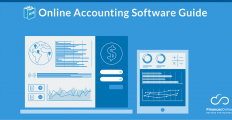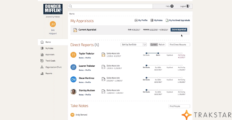As your business continues to grow more and more, you may find yourself in a situation where your current resources are not enough to handle the hefty workload that comes with such growth. On any given day, you can find yourself:
- Screening tenants
- Reviewing applications
- Preparing a lease agreement
- Handling tenant complaints
- Collecting rent from tenants
- Repairing a property
- Handling an eviction
Juggling all of these responsibilities across all of your properties simultaneously could begin to feel like an impossible task. For this reason, it may be in your interest to invest in a tool that provides a simple and streamlined way to manage all aspects of your business, all in one place. This is where property management software becomes essential.

What is property management software?
In simple terms, property management software is an application or program that is designed to assist property managers, landlords, or owner/investors. It helps greatly with their day-to-day tasks and generally makes their jobs easier. The majority of these programs boast accounting and operations features, as well as management and listing assistance. Some also give property managers and landlords the ability to streamline all aspects of their business in one single app. This includes signing lease agreements, screening tenants, and collecting rent from the tenants.
Does this sound like something that will help you organize and grow your business like never before? If so, it may be in your best interest to invest in some property management software. But this is where the key question comes in:
What should I look for in good property management software?
If you are also asking yourself this question, you have come to the right place. In this guide, we will cover the most important questions that you should ask yourself before investing in this software.
Questions to Ask Before Purchasing Property Management Software
Below, we have listed the most important questions that you should be asking before deciding whether or not to go through with purchasing the property management software.
Is there a free trial?
The first thing that you confront when in the market for this software is a huge variety of choices. Many softwares offer similar features and perform closely to each other, but there are always some differences between them. This is where it becomes important to have some sort of free trial or demo for it. A free trial for the software allows you to try various options as you browse and test every single one before making the big decision. Here you can find a list of the best property management software that offers a free trial or demo before committing to it.
How easy is it to use?
To a property manager or landlord, ease of use is something that is very highly valued. When taking advantage of a free trial, it is rare to be offered any sort of training on how to utilize the software. This is typically offered as a training after being onboarded into the software. It is important that you note how difficult it was for you to do essential things like creating a property, listing a unit, writing a lease agreement, and managing your tenants. These are the simpler things that should be easy to figure out in any software. If not, this could be an indication that the software is not easy to use and would be confusing to implement into your business.
Are there any onboarding fees?
Many of the property management softwares that you will find when browsing through your options will charge an onboarding fee. These onboarding fees are often utilized to pay for your training to become more familiar with the program. This onboarding can also cover the costs of migrating your data from other software into the new property management software that you have decided on using. Although onboarding can be very beneficial, it is still important to consider the amount that you will be charged to ensure that it is within your budget.
Are there any other fees to worry about?
When going over the pricing of a software, it is vital to take into account all of the different fees that you can be charged just for using it. These fees can include a support fee, a training fee, a monthly or yearly fee, or even a tech fee. All of these fees should be clearly listed when you are signing up to use the software, and you should pay close attention to them because they can add up very quickly and easily break your budget.
What are the payment options?
One of the other important things to note when in the market for a property management software is how you are going to be able to pay it. Different softwares have different methods of payment, some being a concrete yearly fee upfront with an annual contract and hefty onboarding fee, and others as a monthly pay-as-you-grow option where your price changes as you add or remove units.
Larger businesses with a larger array of properties may opt for the annual fee since it usually comes with a nice discount of around 10-20%, while some smaller businesses may choose to be charged per property every month. This article covers more about the pricing of this kind of software and breaks down the different kinds of payment options that exist.
Are there any contracts?
Another important aspect of a property management software is whether or not the buyer is bound by a contract. Like many other services, many property management softwares require some sort of contract when signing up. This contract can vary in length but typically accomplish the same thing. Signing up with a contract could mean that you must stay with that company for some period of time. If you want to cut the contract short, you will most likely be charged extra fees and/or deductions or need to pay the remainder out. For this reason, it is important to search through the agreements to make sure that you are not signing up for a contract that you didn’t know about.
Is there a money-back guarantee?
When looking into which property management software you would like to invest in, you might want to check if you can use a money-back guarantee in case you don’t like the software. This money-back guarantee is useful when you are not satisfied with what you are paying for. It can also be useful if you have changed your mind and would like to use a different service.
How long does the training take?
Depending on your level of familiarity with this kind of software, your training time may vary. The time that it takes for one to complete training also depends on the complexity and intricacy of the software. Some softwares offer training longer than others made for users who are completely new to the software. However, some offer more concise training for buyers who are already slightly familiar with this kind of software. If you are completely new to property management software, a more complete and thorough training experience will most likely benefit you the most. Not sure where to find a course like this? Find a variety of options in this list of the best property management training courses to get started today.
How good is the customer service?
Of all the attributes on this list, customer service can be one of the most important ones listed thus far. For a business, good customer service means that they do not have to stress about problems with the software. It also means that they can receive support whenever it is needed. Ideally, the property management software would offer customer service in under 10 minutes with real people (and not automated chat bots) helping to resolve any issues you may have. Good customer service should be able to provide accurate directions and guidance in order for you to continue growing your business without interruption.
Does it meet your business’s needs?
Every single business is different. And because of this, the needs of every business are also different. This means that every business will have a different preference for which software to use. One software could be designed more for a larger business, while another could be designed for a smaller business that is just starting out. Therefore, the aspect that should drive your decision the most is whether or not the software fits your own business’s needs. If it seems like most property management softwares do not meet all of your business’s needs, or if you want something that is more centralized and organized, an all-in-one property management software will most likely be the best solution for you.
Conclusion
It can become very cumbersome to perform all the daily tasks of a property manager on your own. And while it can also be a headache to choose a software from the sea of options that exist, it is an investment that will pay off in a very short amount of time. Whether you are a small business that needs to manage only a few properties or a large business that manages hundreds of properties daily, a property management software will help simplify your workload and streamline your business to grow and become more efficient.























Leave a comment!